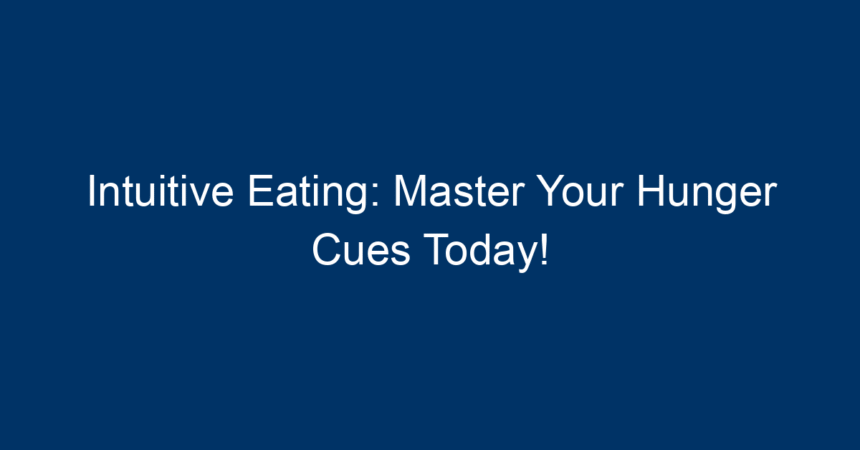In a world dominated by diet culture, where rules about food reign supreme, many individuals find themselves disconnected from their bodies’ natural signals. Enter intuitive eating—a revolutionary approach that emphasizes listening to your body’s hunger cues rather than adhering to external diet restrictions. Understanding intuitive eating can transform your relationship with food, helping you foster a healthier mindset and improve your overall well-being.
What is Intuitive Eating?
Intuitive eating is a philosophy that encourages individuals to trust their instincts regarding food choices. Developed by dietitians Evelyn Tribole and Elyse Resch in their bestseller, Intuitive Eating, this approach comprises ten principles that aim to help people build a healthier relationship with food. By promoting self-awareness, intuitive eating invites you to reconnect with your body’s natural instincts and understand what it truly needs.
The Core Principles of Intuitive Eating
Understanding the principles behind intuitive eating is crucial to mastering your hunger cues. Here’s a breakdown of these foundational concepts:
-
Reject the Diet Mentality
Let go of restrictive diets and unrealistic expectations. It’s essential to recognize that dieting can lead to a cycle of deprivation and overeating. -
Honor Your Hunger
Pay attention to your body’s hunger signals. Listen to when you are physically hungry and respond by nourishing yourself. -
Make Peace with Food
Allow yourself to enjoy all foods without guilt. When all foods are permissible, the urge to binge on restricted foods diminishes. -
Challenge the Food Police
Silence your inner critic. Many people have an internal voice that critiques their food choices. Learning to challenge this voice is critical. -
Feel Your Fullness
Tune into your body and recognize when you are satisfied. Take your time while eating, savoring each bite. -
Discover the Satisfaction Factor
Eating is meant to be pleasurable. Ensuring that your meals are satisfying—both emotionally and physically—can help prevent overeating. -
Cope with Your Emotions Without Using Food
Emotional eating often stems from a desire to soothe difficult feelings. Developing alternative coping strategies is vital. -
Respect Your Body
Understand that every body is unique. Accept your body’s shape and size while focusing on health and nourishment. -
Exercise—Feel the Difference
Engage in physical activities that you enjoy rather than adhering to rigid workout routines. - Honor Your Health—Gentle Nutrition
While intuitive eating emphasizes freedom, it also encourages you to consider the nutritional value of food while still listening to your hunger cues.
The Benefits of Intuitive Eating
Improved Relationship with Food
Intuitive eating fosters a healthier relationship with food. By emphasizing internal signals over external rules, this approach allows you to view food as a source of nourishment and pleasure rather than guilt. When you stop labeling foods as "good" or "bad," you are liberated to make choices that serve your body best.
Enhanced Body Awareness
One of the core tenets of intuitive eating is to increase body awareness. As you become more in tune with your hunger and satiety cues, you establish a deeper connection with your body. This heightened awareness does not just apply to eating; it also spills over into other aspects of your life, promoting a more mindful existence.
Better Mental Health
Dieting often leads to feelings of deprivation and guilt, which can contribute to anxiety and depression. In contrast, intuitive eating encourages freedom and promotes emotional well-being. By respecting your body and honoring your cravings, you can experience a significant boost in your overall mood.
Sustainable Weight Management
While intuitive eating is not a weight loss program, many find that it naturally leads to a healthier weight over time. By encouraging natural hunger cues, this approach helps you avoid the yo-yo dieting cycle and instead embrace a healthier, more sustainable lifestyle.
How to Get Started with Intuitive Eating
Embarking on your intuitive eating journey might feel overwhelming at first, but it can be broken down into manageable steps.
1. Journal Your Feelings
Start by keeping a journal of your thoughts around food. Note when you feel hungry, when you eat, and how you feel afterwards. This exercise helps you identify patterns and understand your emotional relationship with food.
2. Eliminate Diet Triggers
Identify external triggers that reinforce diet mentality. This could mean unfollowing social media accounts that promote restrictive diets or removing diet books from your environment. Creating a supportive space is essential for your intuitive eating journey.
3. Practise Mindful Eating
When you sit down to eat, focus on the food in front of you. Eliminate distractions like TV or smartphones. Engage your senses—notice the colors, textures, and aromas of the food. This practice can deepen your enjoyment and help you recognize your hunger and fullness cues.
4. Experiment with Different Foods
Try incorporating a variety of foods into your meals. This not only enhances your palate but also teaches you which foods satisfy you.
5. Seek Professional Support
Consider speaking with a registered dietitian who specializes in intuitive eating. They can provide guidance tailored to your personal journey and help you navigate any obstacles you may face.
Common Misconceptions About Intuitive Eating
Despite its growing popularity, there are still misconceptions surrounding intuitive eating. Here are a few that need to be debunked:
-
Intuitive Eating Means Eating Whatever You Want: While it encourages freedom, intuitive eating is about listening to your body. You might find that your body craves different foods than you expected.
-
It Leads to Weight Gain: Intuitive eating promotes a balanced relationship with food, which may lead to more sustainable weight management over time.
- Intuitive Eating is Just Another Diet: Unlike traditional diets that focus on restriction, intuitive eating emphasizes self-trust and body awareness.
Conclusion: Take Control of Your Eating Habits Today
Mastering your hunger cues through intuitive eating can profoundly impact your physical and emotional health. It’s about forging a positive relationship with food that promotes enjoyment and satisfaction while fostering body awareness and self-compassion. By rejecting the diet mentality and embracing your natural instincts, you can enjoy a liberated approach to eating that truly nourishes you.
Actionable Insights:
- Start keeping an eating journal to track your hunger signals and emotions.
- Experiment with mindful eating techniques, setting aside distractions during meals.
- Gradually eliminate diet triggers from your environment to create a supportive space.
- Consider seeking professional guidance to navigate your intuitive eating journey.
- Embrace the journey, and remember that it’s about progress, not perfection.
Now is the time to break free from restrictive diets and embrace the fulfilling practice of intuitive eating. Start listening to your body’s cues today, and watch as your relationship with food transforms for the better.




